As Russia’s forces edge ever closer, Kharkiv’s mayor has a defiant message for Putin
Exclusive: Mayor of Kharkiv Igor Terekhov tells The Independent that Russian forces are trying to ‘destroy’ his city, home to some 1.4 million civilians

The three Russian glide bombs pound into the residential tower block, ripping apart several floors. At least 10 are injured in a strike that is part of what has become a near-daily aerial assault on Ukraine’s second-largest city.
In his office a few streets away is Kharkiv’s mayor Igor Terekhov, who is quickly rushed into a meeting as our interview is put on hold. Images then start to flood social media showing the destruction wrought upon the civilian-populated area near the Peremoha metro station in the city centre.
When the interview resumes, Terekhov is forced to take three calls while emergency services rushed to the scene nearby to help the wounded. Aides intermittently grab the mayor to update him on the developing situation.
“Already today, the Russians have fired five glide bombs,” he says of the attack as one of his aides finishes whispering in his ear. “Just a few minutes ago, there were several strikes that hit the central part of the city. There is a huge fire there. This morning we also had a few strikes. There has been a lot of destruction. This is the current situation we have now.”
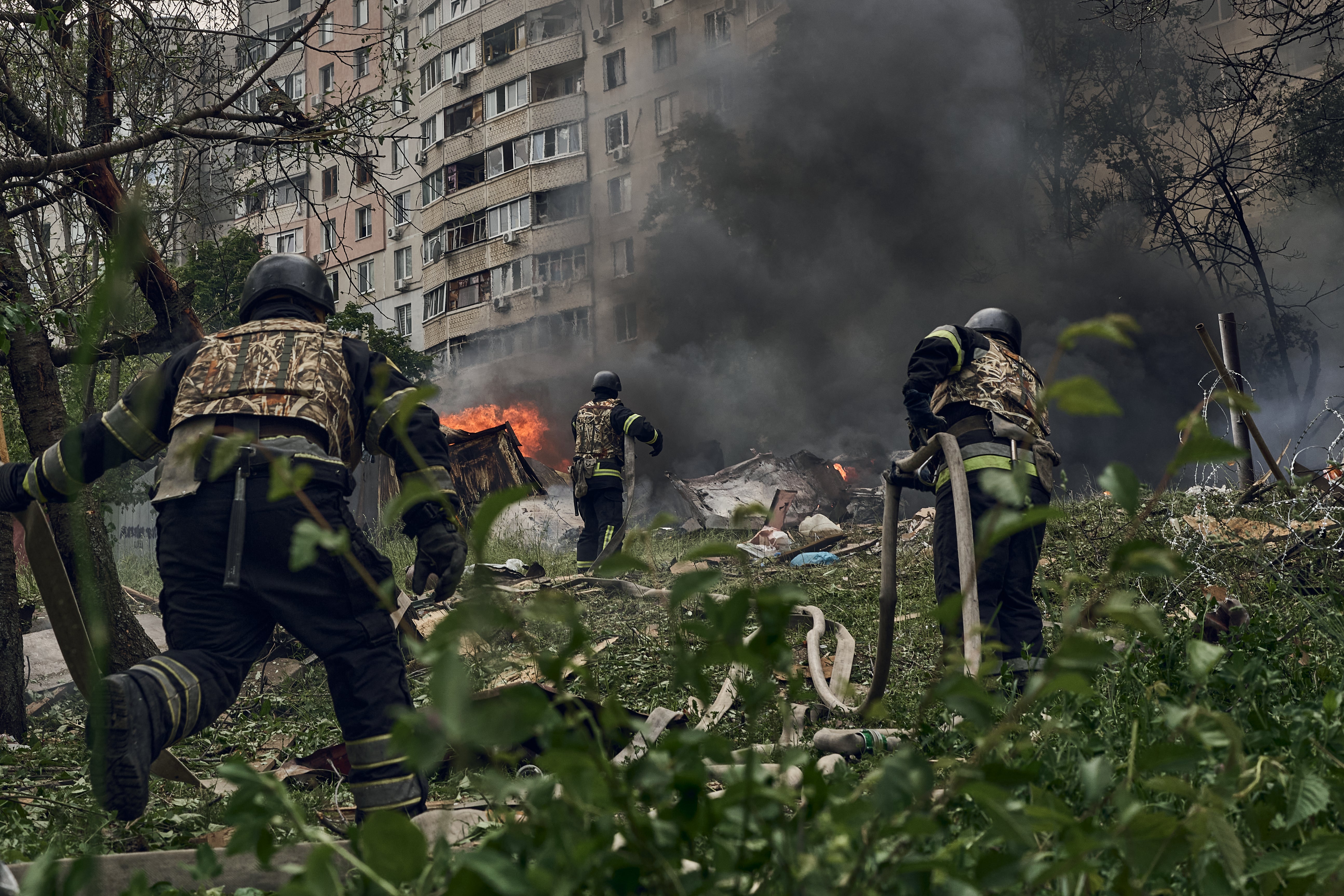
An update from Ukraine’s interior ministry on Wednesday said two people had died and five were recorded as injured from the strikes after the final tally was counted up. There have been further strikes this week, including a substantial one on Friday. At least two people were killed and another 13 wounded after several glide bombs hit the city’s northwest district of Kholodnohirskyi.
Over the last 10 days, tens of thousands of Russian soldiers have been advancing towards the city, pushing to within artillery range of Kharkiv’s populated centre while sending thousands of civilians fleeing. Poor defensive fortifications on the border with Russia and a crippling shortage in weapons – as Kyiv has waited for delayed US military aid – have allowed the Kremlin’s forces to push several miles into the region, forcing back Ukraine’s first line of defence.
That has increased the threat of Russian artillery and missile strikes on the city, with air raid alerts – vital to warn civilians of incoming threats – failing Kharkiv citizens, Terekhov says, because the Kremlin’s forces are “too close”.
Referring to Russia’s S-300 missile systems station nearby, Terekhov says: “From the launch time to the strike, the missile is only in the air for 40 seconds. The air alarm starts only after the strike.”
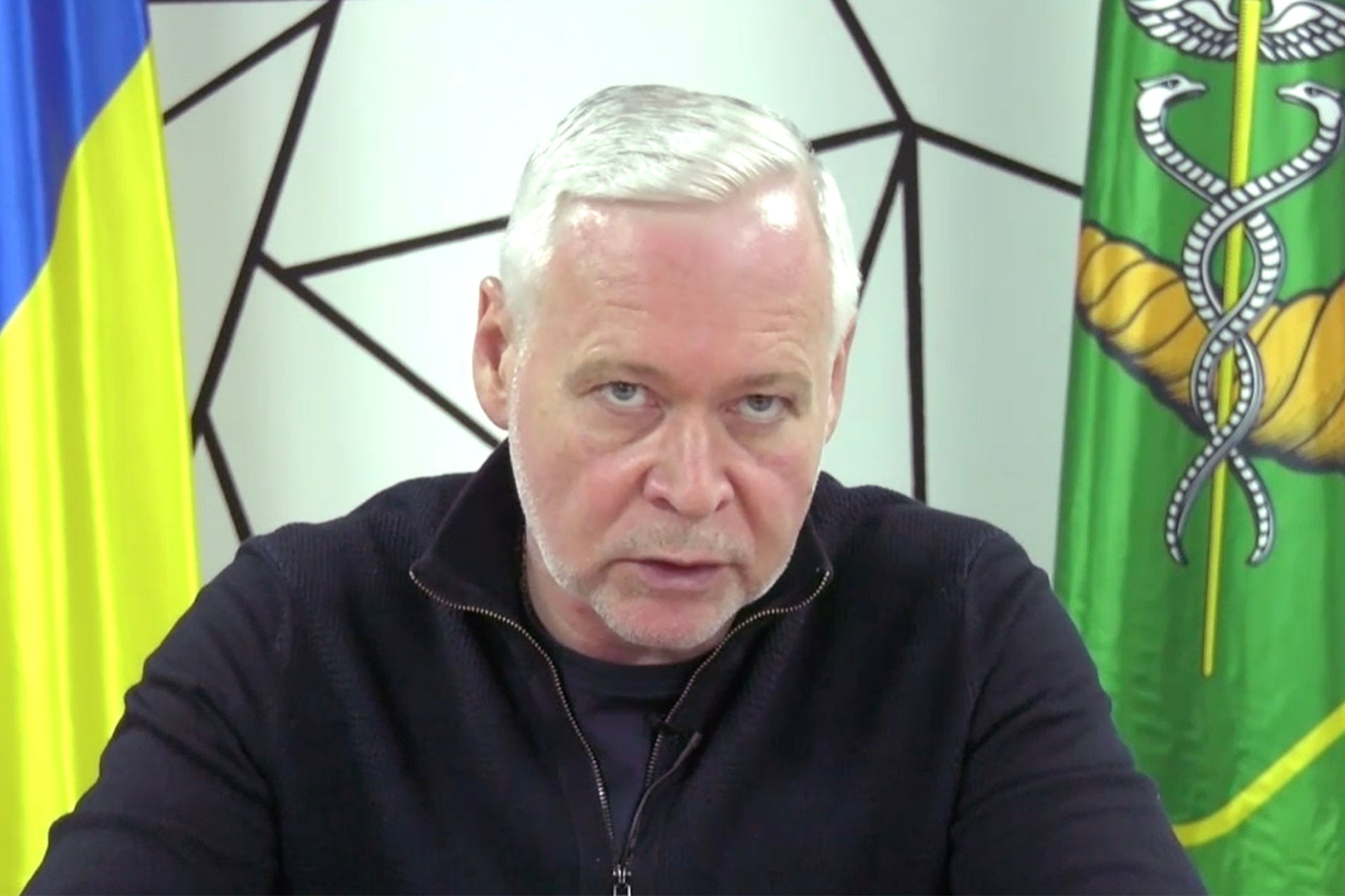
He adds that Russian forces fire so frequently at Kharkiv that it has become “hard to count how many missiles hit the city directly every day”.
“They are constantly shooting and destroying this city,” he says. “They are killing our people.”
Alongside S-300 missiles, Terekov says Russia is also regularly firing Iranian-made “Shahed” kamikaze drones and glide bombs. These bombs, some of which weigh more than a tonne, have been described as “building destroyers” that float towards their target once dropped, using attached “wings” and GPS systems.
But Terekov insists there are no plans to evacuate the region’s capital, home to 1.4 million civilians, despite Russian forces advancing to within 20 miles of the city centre.
“We are not thinking about the evacuation of Kharkiv,” he says, before suggesting that while the bombs are still falling, the city is operating on a “business as usual” platform.
“We are not seeing a huge amount of people leaving the city,” he says. “Some of them leave, some of them actually return.”
Almost 8,000 people have been evacuated from towns near the fighting as the advancing Russian forces relentlessly bombed the region.
Aid workers in Kharkiv city looking after the evacuees tell The Independent they have “never experienced” this many fleeing civilians before.
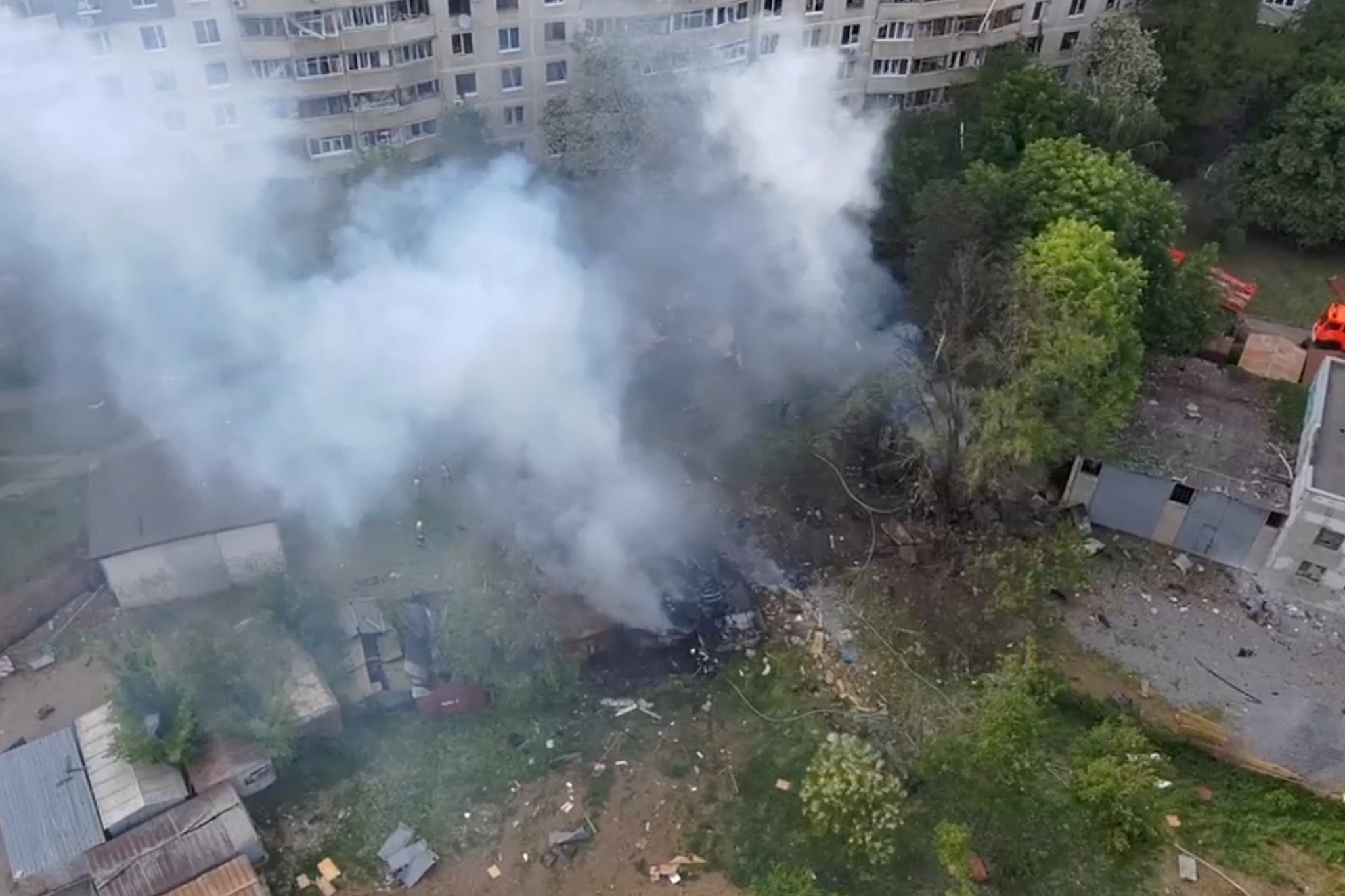
“It’s a little bit crazy,” says Andrii Semenko, a senior child protection officer for humanitarian aid organisation Rescue, which is running a shelter in Kharkiv.
He says civilians arriving in the city are so shell-shocked that they start crying even when a door is shut too loudly.
“What they are getting afraid of is the noises,” he says. “If there are explosions – or even just a door closes – they get very frightened or start crying.”
Terekhov says around 5,000 of those who have been evacuated have moved into Kharkiv city. Semenko suggests as many as 200 of those are children.
When asked whether military reinforcements had been sent to the city to shore up its defences, Terekhov declines to respond, saying he was unable to offer information publicly that could compromise their fight against Russian forces.
A senior colonel in Ukraine’s military told The Independent a few days earlier, however, that the military was sending their “most experienced brigades” to stabilise the situation.
“I think this brigade, which I know well, will be able to stop the Russian attack from spreading and then push them back or destroy them,” the colonel said.
Ukraine’s top commander warned on Friday of “heavy battles” looming in the area. Colonel General Oleksandr Syrskyi said the Russian attacks around Kharkiv had expanded the frontline by around 40 miles.
“We understand there will be heavy battles and that the enemy is preparing for that,” he added.
Speaking during a state visit to China on Friday, Vladimir Putin claimed Russia was creating a “buffer zone” in Ukraine’s northeast to protect its own border regions, but said capturing the city of Kharkiv was not part of the current plan. Ukrainian officials do not believe such talk, preferring to watch Russia’s actions.
The attack into the Kharkiv region has taken place across two areas of the Russia-Ukraine border and has involved around 30,000 Russian troops. In the northernmost attack, Russian forces advanced nearly six miles, capturing eight villages in the process and bringing Kharkiv’s city centre within their artillery range.
Further east, Ukrainian police have admitted that Russian forces were establishing positions inside the border town of Vovchansk, which was the first line of Ukraine’s defence over the weekend and is around 35 miles from Kharkiv.
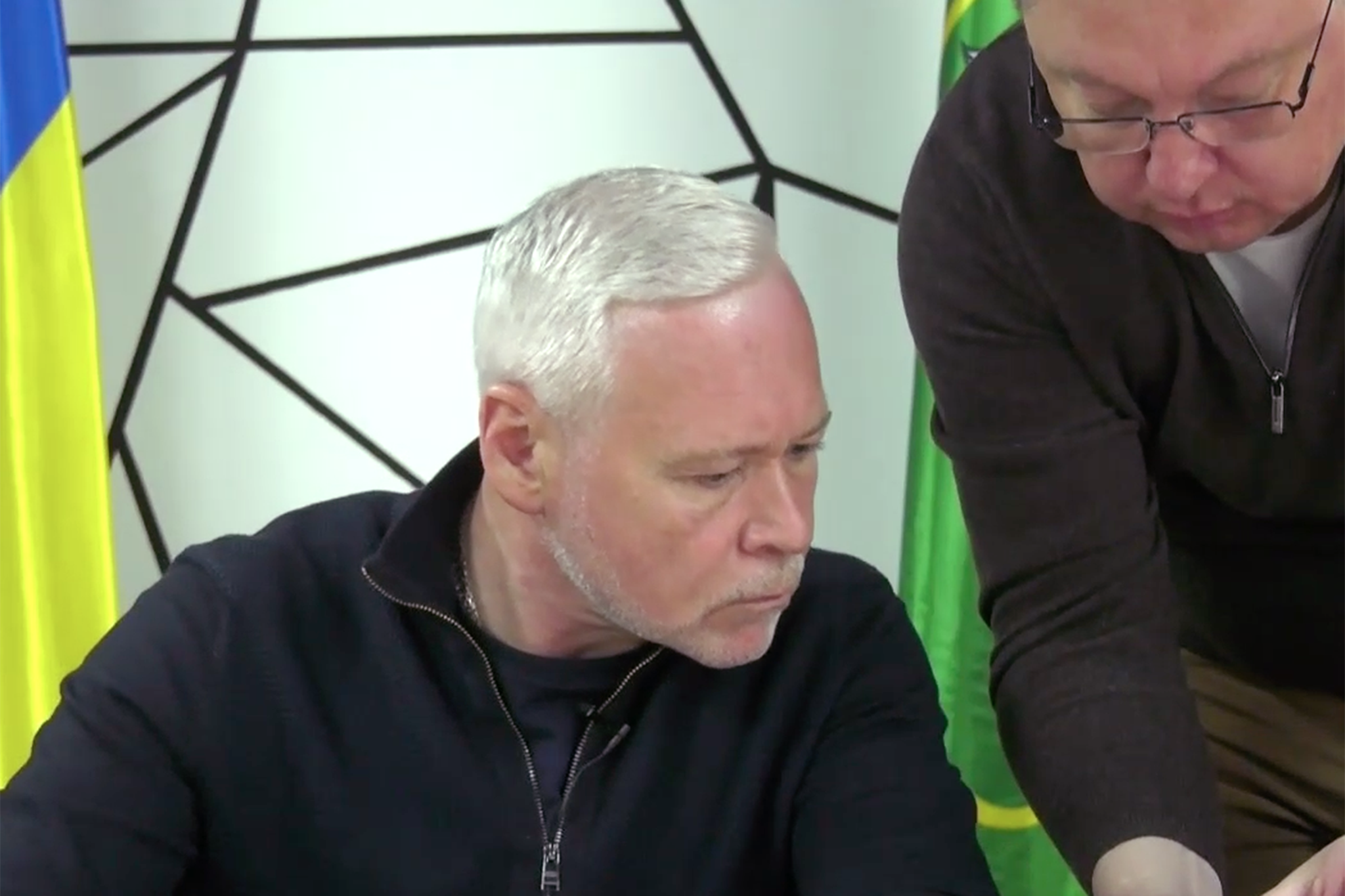
“The situation is extremely difficult. The enemy is taking positions on the streets of the town of Vovchansk,” Oleksiy Kharkivskiy, Vovchansk’s patrol police chief, said on Facebook.
Terekhov is also clear about who is to blame for this attack, pointing to the delay in a $61bn US weapons package that was originally proposed in October but did not pass until last month.
While the first tranches of aid have started to arrive now, Russia has been capitalising on an artillery advantage of around seven shells to Ukraine’s one for several months, capturing swathes of territory further east before opening up this second front in Kharkiv.
“I am not in a position to give command on the military situation but what I am personally thinking is that Russia used this advantage to collect their forces and start doing what they are doing,” he says. “Now they are destroying people’s lives.”
He urged that such delays do not happen again.
Despite Russia’s recent success, however, Ukrainian officials and analysts maintain that the Kremlin’s troops would be hard-pressed to reach Kharkiv city.
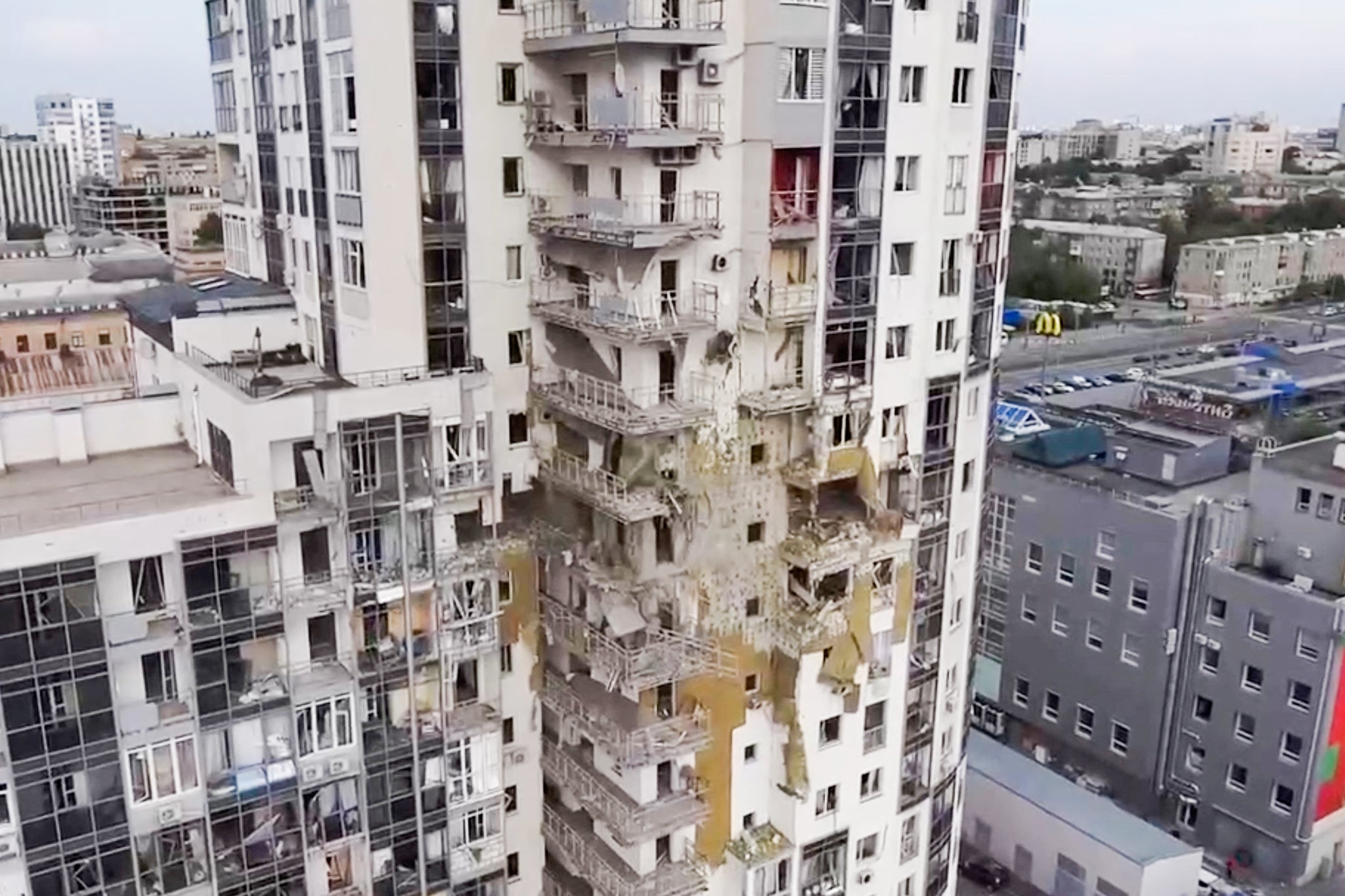
“It is unlikely that Russia has enough forces in the area to directly assault Kharkiv city,” says one Ukrainian former officer who asked to remain anonymous to speak openly. The officer runs an open-source intelligence group called Frontelligence Insight, known to have very close ties to the military.
“One possibility is that Russian forces are trying to draw Ukrainian forces from the Donbas to Kharkiv, although I am not entirely confident in this theory,” the officer says. “Another motive could be to establish a buffer zone to push Ukrainian forces further from the border. This would make it harder for Ukraine to target valuable military assets in the [neighbouring] Belgorod region.”
Terekhov, a politician not a soldier, can only continue to encourage resilience among the citizens of Kharkiv, and do so by refusing to leave the city.
When asked if he has a message for those Russian forces pushing on the border, the otherwise-stoic Terekhov laughs.
“What can I say to them? If I ask them to stop, they won’t.”






Join our commenting forum
Join thought-provoking conversations, follow other Independent readers and see their replies
Comments